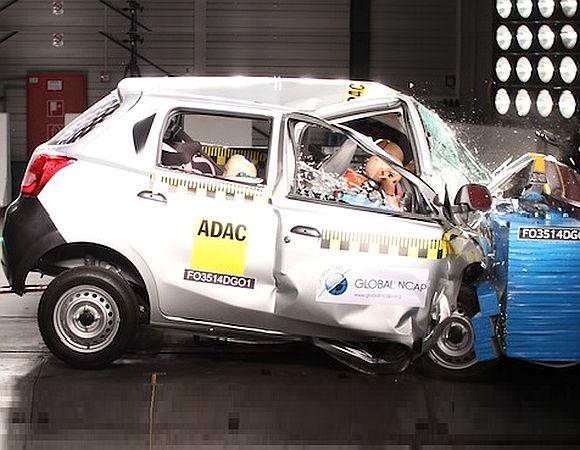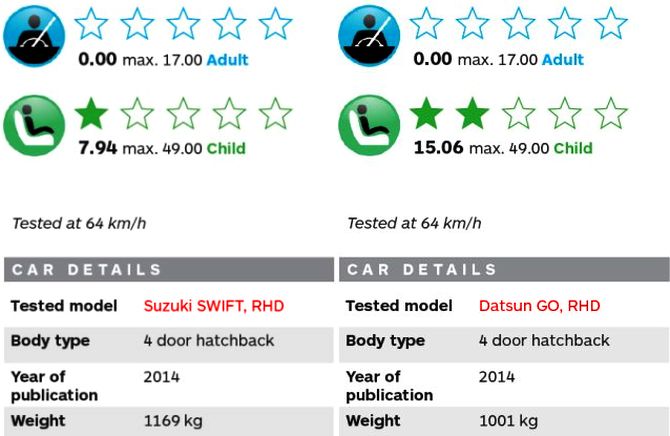
In yet another case of popular cars in India not meeting international safety norms, popular hatchbacks Maruti Suzuki Swift and Datsun GO of Nissan have failed crash tests conducted by Global NCAP, showing high risk of life-threatening injuries.
According to the Global NCAP, an umbrella body of consumer car safety testing bodies, crash tests of Nissan's Datsun GO and Maruti-Suzuki's Swift demonstrated a high risk of life-threatening injuries with both cars receiving zero-star safety rating for their adult occupant protection.
"These risks would be significantly reduced if the cars had to comply with the UN test regulation for frontal and side impact," Global NCAP said in a statement.
When contacted, Nissan said its Datsun GO meets the required local vehicle regulations in India while no comments could be obtained from Maruti Suzuki. Swift is one of the top-selling cars in India.
As per its test, Global NCAP said Maruti Suzuki Swift "scored zero stars for adult occupant protection and just one star for child occupant protection".
"The Swift's vehicle structure showed signs of collapsing in the crash and was rated as unstable. The car's lack of standard-fit airbags meant that the driver's head makes direct contact with the steering wheel – the dummy readings indicate a high probability of life threatening injuries," it said, adding the test was conducted at a speed of 64 km/h.

The Datsun GO from Nissan also scored zero stars for adult occupant protection and just two stars for child occupant protection.
"The Datsun GO's vehicle structure collapsed in the crash and was rated as unstable. The car's lack of airbags meant that the driver's head makes direct contact with the steering wheel and dashboard – the dummy readings indicate a high probability of life-threatening injuries," it said.
The failure of the body shell makes it redundant to fit an airbag, it said.
However, unlike the GO, in Swift fitting with airbags would improve occupant protection, Global NCAP said.
Global NCAP chairman Max Mosley said: "India has the potential to be a world leader in the automobile industry but Indian consumers are not aware of how unsafe they would be in case of a crash."
He said India is launching an NCAP consumer testing programme, which would be a step forward for safety but regulations based on the UN's minimum crash test standards are also needed.
"If this happens, every new car sold in India would have a proper crash structure and airbags," Mosley said.

Reacting to the crash results, Nissan India Operations President Guillaume Sicard said: "Datsun GO meets the required local vehicle regulations in India...Safety is important and is a key issue in India. Automotive regulation standards in fast-growing countries are constantly evolving and as a global manufacturer, we are willing to adopt as well as help evolve standards in vehicular safety standards."
Sicard said the Datsun GO was developed with a "strong intention to deliver the best adapted solutions to the local conditions, from best in class braking and good visibility to durability, seat comfort and reduced motion sickness - all being taken as a package aim to decrease potential risk of road accidents".
Earlier this year, some of the most popular small cars sold in India, including Maruti Alto 800, Tata Nano, Ford Figo, Hyundai i10 and Volkswagen Polo, had failed Global NCAP crash tests showing high risk of life-threatening injuries in road accidents.
As per the tests done by Global NCAP, these cars received zero star for adult protection ratings in a frontal impact at 64km/hr.
The combined sales of these five cars account for around 20 per cent of all the new cars sold in India last year, Global NCAP said.
As per Society of Indian Automobile Manufacturers, total car sales in India stood at 18,07,011 units in 2013.







